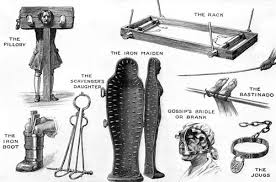记忆方法
记忆方法:偷窃被拷打
中文词源
torture 拷问,拷打,折磨,痛苦
来自拉丁语 tortus,扭曲的,扭成一团的,词源同 turn,torment.-ure,名词后缀。引词义拷问, 折磨。
英语词源
- torture
-
torture: see torment
- torture (n.)
- early 15c., "contortion, twisting, distortion; a disorder characterized by contortion," from Old French torture "infliction of great pain; great pain, agony" (12c.), and directly from Late Latin tortura "a twisting, writhing," in Medieval Latin "pain inflicted by judicial or ecclesiastical authority as a means of punishment or persuasion," from stem of Latin torquere "to twist, turn, wind, wring, distort" (see torque (n.)). The meaning "infliction of severe bodily pain as a means of punishment or persuasion" in English is from 1550s. The theory behind judicial torture was that a guilty person could be made to confess, but an innocent one could not, by this means. Macaulay writes that it was last inflicted in England in May 1640.
- torture (v.)
- 1580s, from torture (n.). Related: Tortured; torturing.
权威例句
- 1. The friction of the sheets against his skin was torture.
- 被单摩擦着他的皮肤,简直像是酷刑。
- 2. 2,000 prisoners died as a result of torture and maltreatment.
- 2,000名犯人死于拷打和虐待。
- 3. There are consistent reports of electrical torture being practised on inmates.
- 一直有报道称犯人被施以电刑。
- 4. I believed that in civilized countries, torture had ended long ago.
- 我原以为在文明国家,严刑拷打早已销声匿迹。
- 5. The confessions were obtained by what amounts to torture.
- 这些供状是用近乎逼供的方式得来的。

